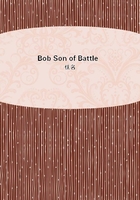
第5章 A SON OF HAGAR(3)
"Yo' maun let me put yo' bit things straight .for yo', mister," she had said shyly; for she feared the little man.
"Thank ye, Mrs. Moore," he had answered with the sour smile the Dalesmen knew so well, "but ye maun think I'm a waefu' cripple."And there he had stood, grinning sardonically, opposing his small bulk in the very centre of the door.
Mrs. Moore had turned down the hill, abashed and hurt at the reception of her offer; and her husband, proud to a fault, had forbidden her to repeat it. Nevertheless her motherly heart went out in a great tenderness for the little orphan David. She knew well the desolateness of his life; his father's aversion from him, and its inevitable consequences.
It became an institution for the boy to call every morning at Kenmuir, and trot off to the village school with Maggie Moore.
And soon the lad came to look on Kenmuir as his true home, and James and Elizabeth Moore as his real parents. His greatest happiness was to be away from the Grange. And the ferret-eyed little man there noted the fact, bitterly resented it, and vented his ill-humor accordingly.
It was this, as he deemed it, uncalled-for trespassing on his authority which was the chief cause of his animosity against James Moore. The Master of Kenmuir it was at whom he was aiming when he remarked one day at the Arms: "Masel', I aye prefaire the good man who does no go to church, to the bad man who does. But then, as ye say, Mr. Burton, I'm peculiar."The little man's treatment of David, exaggerated as it was by eager credulity, became at length such a scandal to the Dale that Parson Leggy determined to bring him to task on the matter.
Now M'Adam was the parson's pet antipathy. The bluff old minister, with his brusque manner and big heart, would have no truck with the man who never went to church, was perpetually in liquor, and never spoke good of his neighbors. Yet he entered upon the interview fully resolved not to be betrayed into an unworthy expression of feeling; rather to appeal to the little man's better nature.
The conversation had not been in progress two minutes, however, before he knew that, where he had meant to be calmly persuasive, he was fast become hotly abusive.
"You, Mr. Hornbut, wi' James Moore to help ye, look after the lad's soul, I'll see to his body," the little man was saying.
The parson's thick gray eyebrows lowered threateningly over his eyes.
"You ought to be ashamed of yourself to talk like that. Which d'you think the more important, soul or body? Oughtn't you, his father, to be the very first to care for the boy's soul? If not, who should? Answer me, sir."The little man stood smirking and sucking his eternal twig, entirely unmoved by the other's heat.
"Ye're right, Mr. Hombut, as ye aye are. But my argiment is this:
that I get at his soul best through his icetle carcase."The honest parson brought down his stick with an angry thud.
"M'Adam, you're a brute--a brute!" he shouted. At which outburst the little man was seized with a spasm of silent merriment, "A fond dad first, a brute afterward, aiblins--he! he! Ah, Mr.
Hornbut! ye 'ford me vast diversion, ye do indeed, 'my loved, my honored, much-respected friend.""If you paid as much heed to your boy's welfare as you do to the bad poetry of that profligate ploughman--"An angry gleam shot into the other's eyes. "D'ye ken what blasphemy is, Mr. Horn-but?" he asked, shouldering a pace forward.
For the first time in the dispute the parson thought he was about to score a point, and was calm accordingly.
"I should do; I fancy I've a specimen of the breed before me now.
And d'you know what impertinence is?"
"I should do; I fancy I've--I awd say it's what gentlemen aften are unless their mammies whipped 'em as lads."For a moment the parson looked as if about to seize his opponent and shake him.
"M'Adam," he roared, "I'll not stand your insolences!"The little man turned, scuttled indoors, and came runnng back with a chair.
"Permit me!" he said blandly, holding it before him like a haircutter for a customer.
The parson turned away. At the gap in the hedge he paused.
"I'll only say one thing more," he called slowly. "When your wife, whom I think we all loved, lay dying in that room above you, she said to you in my presence--"It was M'Adam's turn to be angry. He made a step forward with burning face.
"Aince and for a', Mr. Hornbut," he cried passionately, "onderstand I'll not ha' you and yer likes lay yer tongues on ma wife's memory whenever it suits ye. You can say what ye like aboot me--lies, sneers, snash--and I'll say naethin'. I dinna ask ye to respect me; Ithink ye might do sae muckle by her, puir lass. She never harmed ye. Gin ye canna let her bide in peace where she lies doon yonder"-- he waved in the direction of the churchyard-- "ye'll no come on ma land. Though she is dead she's mine."Standing in front of his house, with flushed face and big eyes, the little man looked almost noble in his indignation. And the parson, striding away down the hill, was uneasily conscious that with him was not the victory.